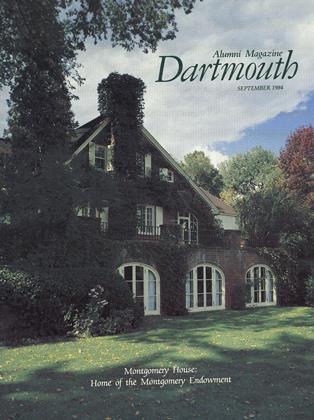Charles E. Hutchinson, new dean of the Thayer School, is a man who welcomes challenges. Which is a good thing, for he begins his job as the engineering school embarks on a six-year expansion program which includes enlargement of facilities and increases in the number of tenure-track faculty and in student enrollment especially graduate enrollment. He comes to Thayer from the School of Engineering at the University of Massachusetts, Amherst, where for four years he headed the department of electrical and computer engineering.
The top priority, as "Hutch" sees it, is to attract more U.S. students into the doctoral program; the shortage of candidates for engineering school faculties is a national crisis. "We worry about our slipping behind other countries in technological expertise, and we should; almost 50 percent of the doctoral students in American engineering schools are from overseas, whereas a decade ago Americans accounted for 75 percent. We'll be a lot further behind by 1990 if we don't address the problem now."
The shortage is compounded by economic facts of life industry is paying top dollar now for well-trained engineers at the bachelor's level. In fact, undergraduate engineering majors from Dartmouth with only an A.B. degree are averaging better than $25,000 starting salaries. "This is happening even though both industry and the professional societies agree that nowadays the master's level degree should be required for professional licensing of engineers," he says. "But industry is desperate for well-trained people, so they take these bright young men and women and say they'll complete their training on the job. But they really can't. The answer is increased support, both public and private, for graduate student stipends, the kind of support that was made available in the late fifties when Russia scared this country into it by sending up the first satellite."
Hutchinson himself benefited from the increase in funding for graduate education during those early post-Sputnik days, as did a large percentage of present-day faculties. After completing his bachelor's degree in electrical engineering at the Illinois Institute of Technology, he did a three-year stint in the Navy, then returned to finish his graduate work at Stanford University. He spent a few years in the aerospace industry but was lured back to academia, embarking on a teaching career at the University of Massachusetts, where he received tenure in 1970.
Hutchinson has also garnered considerable administrative experience over the course of his career. During the late seventies he served as associate dean for academic affairs and later as associate dean for research for the whole U.Mass. Graduate School. He returned to the engineering school to head his own department (which in itself is larger than the entire Thayer School) and has been widely praised by his colleagues for both his leadership and his fund-raising skills.
Dean Hutchinson is excited by what he sees as Thayer's unique qualities. "First of all we have bright Dartmouth undergraduates who are far above the average [student] in all but the very top few of the country's more than 200 engineering schools. They get four years in the liberal arts program with a concentration in the mathematics and en- gineering sciences, plus a fifth year before they can earn the B.E. degree. Then there is Thayer's non-departmental organization, where students are not tracked into a specific branch of engineering, so they go into the workplace far better trained and more wellrounded than most engineers. After all, most of the problems they'll encounter are not compartmentalized. They may be compounded of electronic or mechanical details, or something else, so the more a student is exposed to, the better he or she will be at problem-solving."
Other special, if not unique, qualities which Hutchinson sees at Thayer include the loyalty and dedication of its Board of Overseers and its alumni and the high quality of its faculty. "In a small school where the faculty is so accessible to students, education can only be firstrate."
He expects to pursue with vigor the course set by the former administration under Carl Long: to add to the very able faculty, to attract more bright graduate students, and to get the funding from industry, the foundations, and government to support Thayer's expansion.
Charles E. Hutchinson, new dean of the Thayer School, looks calm and collected as he faces the challenges of spearheading a six-year expansion of engineering facilities, faculty, and student body.
 View Full Issue
View Full Issue
More From This Issue
-
 Feature
FeatureDennis Brutus Speaks Out
September 1984 By Kendal Price '78 -
 Cover Story
Cover StoryThe Montgomery Endowment Finds a Home
September 1984 By Shelby Grantham -
 Feature
FeatureRichard Eberhart at Eighty: The Long Reach of Talent
September 1984 By Jay Parini -
 Feature
Feature"Three ... Forty-two ... Hut"
September 1984 By Jim Kenyon -
 Feature
Feature"Innocent Ardor and Delight": A Tribute to Richard Eberhart
September 1984 By James Melville Cox -
 Article
ArticleRumblings On Fraternity Row
September 1984 By Fred Pfaff '85
Article
-
 Article
ArticleAN UNUSUAL TRIBUTE
January 1917 -
 Article
ArticleMost of the pictures I have seen of Mr. Marsh present him with a smooth face and a boyish look.
July 1920 -
 Article
ArticleNew Navy Unit
December 1942 -
 Article
ArticleA Tribute to Natt W. Emerson, Practical Idealist
March 1936 By Homer Eaton Keyes '00 -
 Article
ArticleSteel and Crinoline
May 1979 By ROBERT H. ROSS '38 -
 Article
ArticleTHE UNDERGRADUATE CHAIR
March 1960 By WILLIAM G. BATT '60


